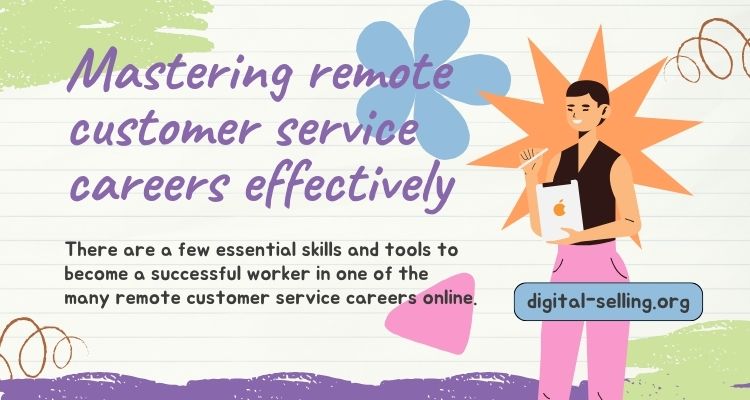There are a few essential skills and tools to become a successful worker in one of the many remote customer service careers online.
In today’s dynamic and evolving professional landscape, remote customer service careers have become increasingly prevalent, offering individuals the flexibility to work from the comfort of their homes. As the demand for remote customer service professionals continues to rise, mastering the necessary skills as well as utilising the right tools is crucial for success in this field. This article will delve into the essential skills and tools required to thrive in customer care remote jobs, empowering individuals to deliver exceptional service while working remotely.
1. Effective Communication Skills (Remote Customer Service Careers #1)
Communication lies at the heart of customer service, and remote professionals need to excel in this skill. Clear and concise verbal and written communication ensures that customers receive the assistance they need without misunderstandings. So, active listening, empathy, and the ability to convey information in a friendly and professional manner are fundamental in customer care remote jobs. In addition, utilising video conferencing, instant messaging, and email effectively is vital for seamless communication.
2. Adaptability and Problem-Solving (Remote Customer Service Careers #2)
Remote customer service professionals often encounter a variety of challenges. The ability to adapt to different situations and think on one’s feet is crucial. Successful remote customer service careers involve not only identifying problems but also offering effective and timely solutions. Also, professionals should be adept at troubleshooting and have a proactive mindset to address customer concerns promptly, even in a virtual setting.
3. Technological Proficiency (Remote Customer Service Careers #3)
Working remotely relies heavily on technology. Proficiency in using customer relationship management (CRM) software, ticketing systems, as well as other industry-specific tools is essential. So, remote customer service professionals should be comfortable navigating different digital platforms, troubleshooting technical issues, and learning new software quickly. Furthermore, they should stay up-to-date with technological advancements in the customer service industry is key to delivering efficient and effective service.
4. Time Management and Self-Discipline (Remote Customer Service Careers #4)
Remote work demands a high level of self-discipline and effective time management. So, professionals in customer care remote jobs must be able to prioritise tasks, meet deadlines, and maintain a structured work routine. Meaning they should create a dedicated workspace, setting boundaries, and managing distractions are crucial for maintaining productivity as well as ensuring a high level of service delivery.
5. Customer Focus (Remote Customer Service Careers #5)
Remote customer service professionals should always prioritise the customer’s needs and satisfaction. Developing a customer-centric mindset involves understanding the customer’s perspective, anticipating their needs, as well as providing personalised solutions. Going the extra mile to exceed customer expectations is a hallmark of successful customer care remote jobs, fostering customer loyalty and positive feedback.
6. Cultural Awareness and Sensitivity (Remote Customer Service Careers #6)
Serving a diverse customer base requires cultural awareness and sensitivity. Remote customer service professionals should be mindful of cultural differences in communication styles, expectations, and values. This understanding enhances the ability to build rapport with customers from various backgrounds, ensuring a positive customer service experience for all.
7. Collaboration and Teamwork (Remote Customer Service Careers #7)
Contrary to the misconception that remote work is isolating, collaboration and teamwork remain essential in remote customer service careers. Professionals need to effectively collaborate with colleagues, share insights, and contribute to a positive team environment. Virtual meetings, collaborative tools, and regular communication channels facilitate effective teamwork, enhancing the overall quality of service provided.
Tools for Remote Customer Service Professionals
1. Customer Relationship Management (CRM) Software
CRM software streamlines customer interactions and information management, helping remote professionals track customer history, preferences, and issues efficiently.
2. Help Desk and Ticketing Systems
These systems enable remote customer service professionals to manage and prioritize customer requests, ensuring a systematic approach to issue resolution.
3. Video Conferencing Platforms
Video conferencing tools facilitate face-to-face communication, enhancing connection and understanding between remote customer service professionals and their clients.
4. Instant Messaging and Chat Platforms
Real-time communication tools allow for quick responses to customer queries, creating a seamless and efficient customer service experience.
5. Knowledge Base and FAQs
Building and maintaining a comprehensive knowledge base helps remote professionals access relevant information swiftly, improving response times and accuracy.
6. Virtual Private Network (VPN)
Ensuring a secure and encrypted connection is crucial for remote customer service professionals when handling sensitive customer information.
7. Collaboration Tools (e.g. Slack, Microsoft Teams)
These tools facilitate communication and collaboration among remote teams, fostering a sense of unity and shared purpose.
Conclusion
Mastering remote customer service careers requires a combination of essential skills and effective utilisation of appropriate tools. Professionals who excel in effective communication, adaptability, technological proficiency, time management, customer focus, cultural awareness, and collaboration are well-positioned for success in this dynamic field. By incorporating these skills and utilising the right tools, remote customer service professionals can deliver exceptional service and build lasting connections with customers, all from the comfort of their remote workspaces.
